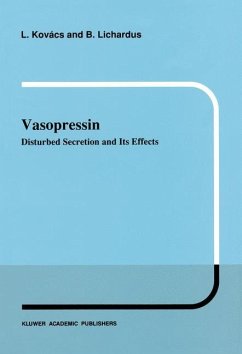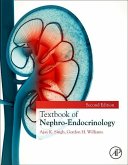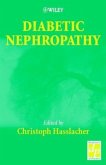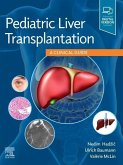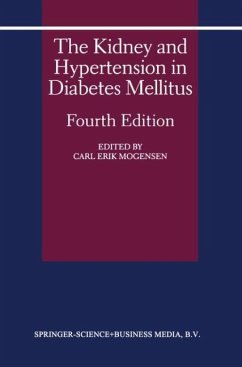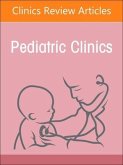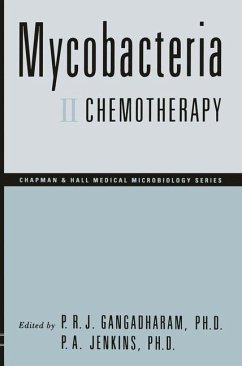- Broschiertes Buch
- Merkliste
- Auf die Merkliste
- Bewerten Bewerten
- Teilen
- Produkt teilen
- Produkterinnerung
- Produkterinnerung
The mechanisms by which animals regulate the volume and composition of their body fluids has long had a particular fascination for students of biology. As a consequence, the subject can lay claim to an impressive record of ground breaking scientific achievements as well as a provocative body of philosophical speculation concerning the role of the system in the origin and evolution of life. Indeed, the entire concept of homeostasis on which so much of o~r current biologic thinking is based, derives from Claude Bernard's pioneering exploration of the forces that determine the composition of this…mehr
Andere Kunden interessierten sich auch für
![Textbook of Nephro-Endocrinology Textbook of Nephro-Endocrinology]() Textbook of Nephro-Endocrinology172,99 €
Textbook of Nephro-Endocrinology172,99 €![Diabetic Nephropathy Diabetic Nephropathy]() Christoph Hasslacher (Hrsg.)Diabetic Nephropathy211,99 €
Christoph Hasslacher (Hrsg.)Diabetic Nephropathy211,99 €![Pediatric Liver Transplantation Pediatric Liver Transplantation]() Nedim HadzicPediatric Liver Transplantation242,99 €
Nedim HadzicPediatric Liver Transplantation242,99 €![The Renin-Angiotensin System: Current Research Progress in the Pancreas The Renin-Angiotensin System: Current Research Progress in the Pancreas]() Po Sing LeungThe Renin-Angiotensin System: Current Research Progress in the Pancreas112,99 €
Po Sing LeungThe Renin-Angiotensin System: Current Research Progress in the Pancreas112,99 €![The Kidney and Hypertension in Diabetes Mellitus The Kidney and Hypertension in Diabetes Mellitus]() The Kidney and Hypertension in Diabetes Mellitus38,99 €
The Kidney and Hypertension in Diabetes Mellitus38,99 €![Pediatric Nephrology, an Issue of Pediatric Clinics of North America Pediatric Nephrology, an Issue of Pediatric Clinics of North America]() Pediatric Nephrology, an Issue of Pediatric Clinics of North America70,99 €
Pediatric Nephrology, an Issue of Pediatric Clinics of North America70,99 €![Mycobacteria Mycobacteria]() Pattisapu R.J. GangadharamMycobacteria38,99 €
Pattisapu R.J. GangadharamMycobacteria38,99 €-
-
-
The mechanisms by which animals regulate the volume and composition of their body fluids has long had a particular fascination for students of biology. As a consequence, the subject can lay claim to an impressive record of ground breaking scientific achievements as well as a provocative body of philosophical speculation concerning the role of the system in the origin and evolution of life. Indeed, the entire concept of homeostasis on which so much of o~r current biologic thinking is based, derives from Claude Bernard's pioneering exploration of the forces that determine the composition of this 'internal sea'. Other seminal achievements credited to this area of inquiry include the first description of a genetically transmitted human disease (familial neurogenic diabetes insipidus); the first isolation sequencing and synthesis of a peptide hormone (vasopressin and oxytocin); the first demonstration of peptide hormone synthesis by way of a larger protein precursor; the first description of resistance to the biologic actions of a hormone (nephrogenic diabetes insipidus); and the conceptual realization of the unique counter-current mechanism that permits concentration of the urine. This record of far reaching and fundamental advances has been distinguished by many fruitful inter actions between clinical and basic science.
Hinweis: Dieser Artikel kann nur an eine deutsche Lieferadresse ausgeliefert werden.
Hinweis: Dieser Artikel kann nur an eine deutsche Lieferadresse ausgeliefert werden.
Produktdetails
- Produktdetails
- Developments in Nephrology 25
- Verlag: Avicenum / Springer / Springer Netherlands
- Artikelnr. des Verlages: 978-94-010-6686-0
- 1989
- Seitenzahl: 316
- Erscheinungstermin: 9. Oktober 2011
- Englisch
- Abmessung: 244mm x 170mm x 18mm
- Gewicht: 548g
- ISBN-13: 9789401066860
- ISBN-10: 9401066868
- Artikelnr.: 39502481
- Herstellerkennzeichnung Die Herstellerinformationen sind derzeit nicht verfügbar.
- Developments in Nephrology 25
- Verlag: Avicenum / Springer / Springer Netherlands
- Artikelnr. des Verlages: 978-94-010-6686-0
- 1989
- Seitenzahl: 316
- Erscheinungstermin: 9. Oktober 2011
- Englisch
- Abmessung: 244mm x 170mm x 18mm
- Gewicht: 548g
- ISBN-13: 9789401066860
- ISBN-10: 9401066868
- Artikelnr.: 39502481
- Herstellerkennzeichnung Die Herstellerinformationen sind derzeit nicht verfügbar.
1 Basal mechanisms of water-salt homeostasis.- 1.1 Body water distribution and osmotic concentration.- 1.2 Balance state.- 1.3 Regulation of extracellular fluid volume (the control of sodium balance).- 1.4 Regulation of extracellular fluid osmolality (the control of water balance).- 2 Hypothalamo-neurohypophyseal hormones and neurophysins.- 2.1 Arginine-vasopressin (AVP) and lysine-vasopressin (LVP).- 2.2 Oxytocin (OT).- 2.3 Other naturally occurring nonapeptides in mammals.- 2.4 Neurohypophyseal peptides without established hormonal activity.- 3 Neurosecretion.- 3.1 Neural organization of the vasopressinergic system.- 4 Biosynthesis, transport and release of vasopressin.- 4.1 Structural organization of vasopressin gene.- 4.2 Posttranslational processing of the vasopressin precursor.- 4.3 Regulation of the vasopressin gene expression.- 4.4 The Brattleboro rat - an animal model of hereditary neurogenic (central) diabetes insipidus.- 4.5 Vasopressin release from the neurohypophysis.- 5 Regulation of vasopressin secretion and thirst.- 5.1 Osmoreceptor mediated regulation of vasopressin and thirst.- 5.2 Functional properties of the osmoregulatory system regulating thirst.- 5.3 Functional relationship between osmotically stimulated AVP secretion and thirst.- 5.4 Nonosmotic regulation of vasopressin secretion.- 6 Vasopressin assays.- 6.1 Bioassays.- 6.2 Radioimmunoassays (RIA).- 6.2.1 Vasopressin in plasma.- 6.2.2 Vasopressin in urine.- 6.2.3 Vasopressin in cerebrospinal fluid.- 7 Receptors and synthetic analogs of vasopressin.- 7.1 Vasopressin receptors.- 7.2 Regulation of vasopressin receptors.- 7.3 Synthetic analogs of vasopressin.- 8 Vasopressin and renal regulation of water homeostasis.- 8.1 Renal osmoregulatory performance -the osmotically free water concept.- 8.2Renal actions by which vasopressin may affect the concentration of urine.- 8.3 Urinary concentration.- 8.4 Clinical evaluation of renal concentrating performance.- 8.5 Urine dilution and its disturbances.- 9 Vasopressin in circulatory control.- 9.1 Vasopressin-induced peripheral vasoconstriction.- 9.2 Blood pressure.- 9.3 Effects on the central nervous system.- 9.4 Role of vasopressin in blood pressure maintenance.- 10 Vasopressin and hemostasis.- 10.1 Vasopressin and factor VIII complex.- 10.2 Vasopressin and fibrinolysis.- 10.3 Vasopressin and platelet function.- 10.4 Clinical experience with desmopressin in the treatment of various bleeding disorders.- 11 Vasopressin and anterior pituitary function.- 11.1 Vasopressin and adrenocorticotropic hormone (ACTH) release.- 11.2 Vasopressin and other anterior pituitary hormones.- 12 Vasopressin and brain function.- 12.1 Vasopressin in cerebrospinal fluid.- 12.2 Vasopressin and memory.- 13 Metabolic effects of vasopressin.- 14 Clinical disturbances of vasopressin secretion and effects (hypo- and hyper-vasopressinism).- 14.1 Hypovasopressinism.- 14.2 Hypervasopressinism.- 14.3 Role of water intake and fluid therapy.- 14.4 Iatrogenic disturbances in body water homeostasis.- 15 Ontogenesis of body water homeostasis and vasopressin secretion.- 15.1 Fetal neurohypophyseal function.- 15.2 Vasopressin during the labor.- 15.3 Regulation of body water homeostasis and vasopressin secretion in newborns and young infants.- 15.4 Arginine-vasopressin during the immediate postnatal period.- 15.5 Development of vasopressin secretion from birth to adulthood.- 15.6 Circadian variations of vasopressin secretion and nocturnal enuresis in children.- 16 Renal water handling, vasopressin secretion and thirst sensation in the elderly.- 16.1 Aging and renal function.- 16.2 Aging and vasopressin secretion.- 16.3 Aging and thirst.- 17 Clinical syndromes associated with hypovasopressinism.- 17.1 Disturbed vasopressin secretion (central diabetes insipidus, CDI).- 17.2 Nephrogenic diabetes insipidus (NDI).- 17.3 Disturbed osmoregulation of thirst and vasopressin secretion (hypovasopressinism without polyuria; essential hypernatremia).- 17.4 Increased thirst with secondary hypovasopressinism - polydipsic diabetes insipidus, PDI.- 17.5 Differential diagnosis of polyuric syndromes.- 18 Hypertonic syndromes.- 18.1 Hypertonicity and the central nervous system.- 18.2 Hypernatremia.- 18.3 Treatment of hypernatremia.- 19 Hypervasopressinism.- 19.1 Causes of hypervasopressinism.- 19.2 Hypervasopressinism - is it always inappropriate?.- 20 The hypotonic syndrome.- 20.1 Non-hypotonic hyponatremias.- 20.2 Hypotonicity and the central nervous system.- 20.3 Hypotonic ("true") hyponatremia.- 20.4 Treatment of hyponatremia.- List of abbreviations.- References.
1 Basal mechanisms of water-salt homeostasis.- 1.1 Body water distribution and osmotic concentration.- 1.2 Balance state.- 1.3 Regulation of extracellular fluid volume (the control of sodium balance).- 1.4 Regulation of extracellular fluid osmolality (the control of water balance).- 2 Hypothalamo-neurohypophyseal hormones and neurophysins.- 2.1 Arginine-vasopressin (AVP) and lysine-vasopressin (LVP).- 2.2 Oxytocin (OT).- 2.3 Other naturally occurring nonapeptides in mammals.- 2.4 Neurohypophyseal peptides without established hormonal activity.- 3 Neurosecretion.- 3.1 Neural organization of the vasopressinergic system.- 4 Biosynthesis, transport and release of vasopressin.- 4.1 Structural organization of vasopressin gene.- 4.2 Posttranslational processing of the vasopressin precursor.- 4.3 Regulation of the vasopressin gene expression.- 4.4 The Brattleboro rat - an animal model of hereditary neurogenic (central) diabetes insipidus.- 4.5 Vasopressin release from the neurohypophysis.- 5 Regulation of vasopressin secretion and thirst.- 5.1 Osmoreceptor mediated regulation of vasopressin and thirst.- 5.2 Functional properties of the osmoregulatory system regulating thirst.- 5.3 Functional relationship between osmotically stimulated AVP secretion and thirst.- 5.4 Nonosmotic regulation of vasopressin secretion.- 6 Vasopressin assays.- 6.1 Bioassays.- 6.2 Radioimmunoassays (RIA).- 6.2.1 Vasopressin in plasma.- 6.2.2 Vasopressin in urine.- 6.2.3 Vasopressin in cerebrospinal fluid.- 7 Receptors and synthetic analogs of vasopressin.- 7.1 Vasopressin receptors.- 7.2 Regulation of vasopressin receptors.- 7.3 Synthetic analogs of vasopressin.- 8 Vasopressin and renal regulation of water homeostasis.- 8.1 Renal osmoregulatory performance -the osmotically free water concept.- 8.2Renal actions by which vasopressin may affect the concentration of urine.- 8.3 Urinary concentration.- 8.4 Clinical evaluation of renal concentrating performance.- 8.5 Urine dilution and its disturbances.- 9 Vasopressin in circulatory control.- 9.1 Vasopressin-induced peripheral vasoconstriction.- 9.2 Blood pressure.- 9.3 Effects on the central nervous system.- 9.4 Role of vasopressin in blood pressure maintenance.- 10 Vasopressin and hemostasis.- 10.1 Vasopressin and factor VIII complex.- 10.2 Vasopressin and fibrinolysis.- 10.3 Vasopressin and platelet function.- 10.4 Clinical experience with desmopressin in the treatment of various bleeding disorders.- 11 Vasopressin and anterior pituitary function.- 11.1 Vasopressin and adrenocorticotropic hormone (ACTH) release.- 11.2 Vasopressin and other anterior pituitary hormones.- 12 Vasopressin and brain function.- 12.1 Vasopressin in cerebrospinal fluid.- 12.2 Vasopressin and memory.- 13 Metabolic effects of vasopressin.- 14 Clinical disturbances of vasopressin secretion and effects (hypo- and hyper-vasopressinism).- 14.1 Hypovasopressinism.- 14.2 Hypervasopressinism.- 14.3 Role of water intake and fluid therapy.- 14.4 Iatrogenic disturbances in body water homeostasis.- 15 Ontogenesis of body water homeostasis and vasopressin secretion.- 15.1 Fetal neurohypophyseal function.- 15.2 Vasopressin during the labor.- 15.3 Regulation of body water homeostasis and vasopressin secretion in newborns and young infants.- 15.4 Arginine-vasopressin during the immediate postnatal period.- 15.5 Development of vasopressin secretion from birth to adulthood.- 15.6 Circadian variations of vasopressin secretion and nocturnal enuresis in children.- 16 Renal water handling, vasopressin secretion and thirst sensation in the elderly.- 16.1 Aging and renal function.- 16.2 Aging and vasopressin secretion.- 16.3 Aging and thirst.- 17 Clinical syndromes associated with hypovasopressinism.- 17.1 Disturbed vasopressin secretion (central diabetes insipidus, CDI).- 17.2 Nephrogenic diabetes insipidus (NDI).- 17.3 Disturbed osmoregulation of thirst and vasopressin secretion (hypovasopressinism without polyuria; essential hypernatremia).- 17.4 Increased thirst with secondary hypovasopressinism - polydipsic diabetes insipidus, PDI.- 17.5 Differential diagnosis of polyuric syndromes.- 18 Hypertonic syndromes.- 18.1 Hypertonicity and the central nervous system.- 18.2 Hypernatremia.- 18.3 Treatment of hypernatremia.- 19 Hypervasopressinism.- 19.1 Causes of hypervasopressinism.- 19.2 Hypervasopressinism - is it always inappropriate?.- 20 The hypotonic syndrome.- 20.1 Non-hypotonic hyponatremias.- 20.2 Hypotonicity and the central nervous system.- 20.3 Hypotonic ("true") hyponatremia.- 20.4 Treatment of hyponatremia.- List of abbreviations.- References.

